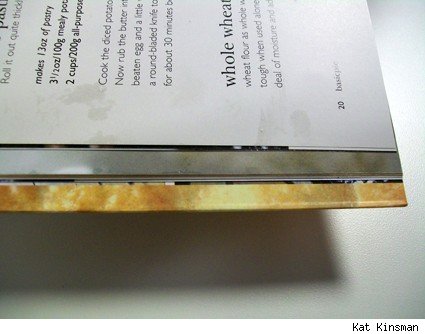I’m not gonna lie — I’m rough on my books. There’s a school of thought treating the physical manifestation of the written word as a sacred object, and I fully respect that. However I, for one, shove an old copy of “How to Cook a Wolf” into the bottom of my bag with the notion that at some point it’ll sustain me on an overextended subway ride. I read “The Devil in the Kitchen” in the bathtub, A.J. Liebling over a lunchtime reuben, and good gosh a-mighty are my cookbooks covered in shmutz.
 But hey, it’s thematic goo; “Molto Italiano” is spattered in tomato sauce, “Pie” — seen here — is all a-smear in lard, “Charleston Receipts” in Otranto Club Punch and “Staff Meals from Chanterelle” slicked with a fine mist of rendered rind bacon. To my mind, these books are being honored, used, proven. Should these books at some point have a subsequent owner, they’ll know what’s been tested, made and made again.
But hey, it’s thematic goo; “Molto Italiano” is spattered in tomato sauce, “Pie” — seen here — is all a-smear in lard, “Charleston Receipts” in Otranto Club Punch and “Staff Meals from Chanterelle” slicked with a fine mist of rendered rind bacon. To my mind, these books are being honored, used, proven. Should these books at some point have a subsequent owner, they’ll know what’s been tested, made and made again.
Still, am I dishonoring the object or the authors when I’m getting the books all mucky? I posed the question to Matthew Lee (whose book “The Lee Bros. Southern Cooking” I’ve doused in all manner of pickling brine), and he noted that he and his co-author, his brother Ted have debated pre-mucking-up copies of their book to nix the blank canvas factor. The recipes therein are warm of heart and humble of origin, so it’s not out of character, but would, say, a gellan-gumming of Grant Achatz’s “Alinea” be a crime against the rather expensive and exceptionally lovely object?
Do you keep your cookbooks in pristine condition, or do you just accept page stains as collateral damage?
Originally published on Slashfood
